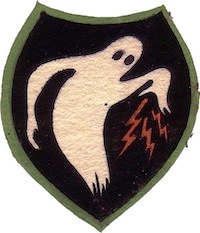“The Supreme Life”
A Sermon Series in Colossians
“Jesus is Lord”
Colossians 2:6-15
Introduction
The Ghost Army was a United States Army tactical deception unit during World War II officially known as the 23rd Headquarters Special Troops. The 1,100-man unit was given a unique mission: to deceive Hitler’s forces and mislead them as to the size and location of Allied forces, while giving the actual units elsewhere time to maneuver. Activated on January 20, 1944, the Ghost Army arrived in Europe in May shortly before D-Day and returned to the US at the end of the war in July 1945. During their tenure, the Ghost Army carried out more than 20 deception campaigns, putting on a “traveling road show” using inflatable tanks, sound trucks, fake radio transmissions, scripts and pretense. Their story was kept a secret for more than 50 years after the war, until it was declassified in 1996.[1]



The mission of this unit was to use deception to convince the enemy that they were larger in number than they actually were, that they were more powerful than they actually were, and to pull resources away from the real fight and true targets. Today we will see that the enemy we face is a defeated foe, who when compared to Christ is inferior – but the Christian’s enemy wants you to return to slavery and be deceived that Jesus just isn’t enough – don’t be fooled.
Prayer
How Does the Christian “Walk in Him?” (vv. 6-7)
6 Therefore, as you received Christ Jesus the Lord, so walk in him, 7 rooted and built up in him and established in the faith, just as you were taught, abounding in thanksgiving.
“as you received Christ Jesus the Lord,”[2] – Paul is emphasizing that they have received a person, and the danger is that what the church believed about Jesus’ deity and His personhood would be corrupted. There should be “the recognition of this historical person Jesus, and the acceptance of Him as Lord.”[3]
“Christ Jesus the Lord,” – this is a fundamental Christian belief. “He (Paul) has developed this idea earlier in the letter, it is a more succinct way of saying Jesus “the image of the invisible God,” “the firstborn over all creation,” (1:15), “the head of the body, the church” (1:18), “the mystery of God” (2:2;1:27), and the repository of “all wisdom and knowledge” (2:3).
It is this central confession, with all its varied and far-reaching implication, to which the Colossians need to return to in order to ward off the threat of false teaching.”[4]
How can we live (walk in) a life that properly places Jesus as the Lord of our lives? Paul gives four ways, “The first two, 1) “rooted” and 2) “built up” are closely related. Rooted is a horticultural metaphor, growing down, once and for all; built up is a construction metaphor for placing one thing upon another and is ongoing, hour-to-hour.
Both rooted and built up are “in him,” You can only live a life pleasing to God when you are attached, like a branch to a vine, and when you allow Jesus (as Lord) to place you like a stone into His plan. Being used amongst other stones in a structure. By being rooted and being built up, the believer will be 3) established in faith. It is an ongoing process of being established.
“Just as you were taught,” Paul is again reinforcing Epaphras’ teaching to them as their pastor. Which then leads to 4) thanksgiving. In Col. 1:24 Paul has already said, “Now I rejoice in my sufferings,” “True gratitude for God’s grace is an important “offensive” measure against the false teaching.”[5]
How Does the Christian Avoid Being “Taken Captive?” (vv. 8-15)
Cling to the Word of God – It Is Complete (v. 8)
8 See to it that no one takes you captive by philosophy and empty deceit, according to human tradition, according to the elemental spirits of the world, and not according to Christ.
In Colossians 1:13 Paul explains that, “He has delivered us from the domain of darkness and transferred us to the kingdom of his beloved Son” There was a domain of darkness that held us as slaves, but because of Jesus we have been set free. Paul is asking why would you want to go back to being a slave? Why would you want to be a slave all over again?
He warns the church to watch out so that no “one takes you captive” – Earlier in 2:4 Paul warns the church “I say this in order that no one may delude you with plausible arguments.” Another way of saying this is hollow or deceptive philosophy. This is the danger, and now Paul gives the means, the how, they could be carried off by this deceptive teaching.
The philosophy that Paul and Epaphras are fighting against is “according to” or based on two things, 1) human tradition. Jesus fought a similar fight with the Jewish religious leaders, Mark 7:8-13 “You leave the commandment of God and hold to the tradition of men.” 9 And he said to them, “You have a fine way of rejecting the commandment of God in order to establish your tradition! 10 For Moses said, ‘Honor your father and your mother’; and, ‘Whoever reviles father or mother must surely die.’ 11 But you say, ‘If a man tells his father or his mother, “Whatever you would have gained from me is Corban”’ (that is, given to God) 12 then you no longer permit him to do anything for his father or mother, 13 thus making void the word of God by your tradition that you have handed down. And many such things you do.” The philosophy is human speculation and not connected to God’s Word. It is an uncoupling of the Word of God and the Thoughts of Man. “They substitute the tradition or men for the truth of God.”[6]
Another way to be carried off as spoil is 2) elemental spirits, “according to the elemental spirits of the world,” – The elements of the universe in which everything in the universe was believed, in Paul’s day, to come from were air, earth, fire, and water.
In the ancient world these elements were often associated with spiritual beings, angels, or gods, and the pagan world had rules about material things and it seems the Christians at Colossae were too preoccupied with rules about the material world and treating them as if they were in control of nature. “They were, in effect, putting them in the place of Christ.”[7]
The false teachers that the church is facing probably aren’t denying Christ’s being central to God’s saving purposes. They seem instead to be arguing that certain practices must be added on in order to achieve true spiritual fulfillment. But when you add to the gospel or God’s Word it actually corrupts it and takes Jesus out of the place where He alone should be supreme over creation and the work of salvation.
An example may be astrology, “the influence of the stars and planets controlling one’s destiny, unless they had the secret knowledge that the false teachers may have claimed necessary to escape their destiny.”[8] What they think is advance spiritual knowledge is actually taking them backwards (toward demonic doctrine, 1 Tim. 4:1).
Cling to Jesus – He is Sufficient (vv. 9-15)
9 For in him the whole fullness of deity dwells bodily, 10 and you have been filled in him, who is the head of all rule and authority. 11 In him also you were circumcised with a circumcision made without hands, by putting off the body of the flesh, by the circumcision of Christ, 12 having been buried with him in baptism, in which you were also raised with him through faith in the powerful working of God, who raised him from the dead. 13 And you, who were dead in your trespasses[9] and the uncircumcision of your flesh, God made alive together with him, having forgiven us all our trespasses, 14 by canceling the record of debt that stood against us with its legal demands. This he set aside, nailing it to the cross. 15 He disarmed the rulers and authorities and put them to open shame, by triumphing over them in him.
It is in Jesus, and Him alone, that God has decisively and exhaustedly revealed himself. All that we can know about God is found on our relationship with him. It may have been that there were false teachers demanding circumcision or some other act or belief to something – Paul says Jesus has already removed what was necessary (your sin) to have a relationship with God.
Your outward expression of this salvation relationship is your baptism. It is faith in Jesus that saves you, and you express this relationship with Jesus in baptism – Jesus pays the debt that was owed, nailing your sin to the cross.
Throughout these verses you see “in him (Christ)” or “with him (Jesus).” Romans 5:12 says, “Therefore, just as sin came into the world through one man, and death through sin, and so death spread to all men because all sinned” When Adam (as the head of mankind) sinned all of the world who followed were then “in Adam.” He represents all of mankind, and sin was spread from generation to generation.
So when Jesus died on the cross He became a second Adam which represented all of mankind. Sin entered the world through one man, and one man would pay the debt to get rid of it forever. Those who place their faith in Jesus are “in him” and no longer “in Adam.” Romans 5:17 “For if, because of one man’s trespass, death reigned through that one man, much more will those who receive the abundance of grace and the free gift of righteousness reign in life through the one man Jesus Christ.”
The false teachers believed that all of matter was evil, and therefore Jesus either wasn’t God or wasn’t a real man (only spiritual). And that in between man and God were angels and demons (emanations) and if you worship the angels and learned the secret knowledge you could break through and make it to God.[10] So when Paul says in verse 9, “in him (Jesus) the whole fullness of deity (God) dwells bodily (human man),” Paul is attacking this false teaching.
The false teaching attacked Jesus being God, or they denied Jesus being a man, or they denied that Jesus’ death on the cross was sufficient for salvation – you need to do something like having celebrating holy days, new moon festivals, having to be circumcised, secret or superior knowledge. Works of any kind, lead to a false gospel and they do not lead to salvation.
Remember earlier Paul says, In Colossians 1:13, “He has delivered us from the domain of darkness and transferred us to the kingdom of his beloved Son” Believers are described as sharing in Jesus’ victory as the Savior of humanity. Then believers are filled in him (v. 10), we then share in the victory over the rebellious cosmic powers. Believers are included in the Savior’s act of reconciling the cosmos to God (we share the gospel and tell out story of redemption to others).
The Colossians were apart of the group who were formerly alienated and enemies of God, and because of Jesus they ten have peace with God. We share in Christ’s supremacy (in his resurrection and we are heavenly raised with Him).”[11] (v. 15) “He disarmed the rulers and authorities and put them to open shame,” and as the church where Jesus is the head, those that once had us as their slaves and held us captives in sin, have been freed and now stand victorious over the domain of darkness – they stand in shame because they lost. They are inferior to the Preeminent one – Jesus Christ the Lord.
Hebrews 2:14 “Since therefore the children share in flesh and blood, he himself likewise partook of the same things, that through death he might destroy the one who has the power of death, that is, the devil, 15 and deliver all those who through fear of death were subject to lifelong slavery.” The imagery is of a triumphant Roman general, parading his defeated captives trough the streets of Rome. When Jesus died on the cross and then rose again from the dead, Satan’s authority was stripped, and as an enemy he was defeated.
Don’t Return to the Losing Side.
Romans 8:37-39 says, “No, in all these things we are more than conquerors through him who loved us. 38 For I am sure that neither death nor life, nor angels nor rulers, nor things present nor things to come, nor powers, 39 nor height nor depth, nor anything else in all creation, will be able to separate us from the love of God in Christ Jesus our Lord.” We still wrestle with the forces of evil, and the domain of darkness is still the enemy, but they cannot be victorious because Jesus has already won the war.
Author Peter Kreeft tells the story of a poor European family who saved for years to buy tickets to sail to America. Once at sea, they carefully rationed the cheese and bread they had brought for the journey. After 3 days, the boy complained to his father, “I hate cheese sandwiches. If I don’t eat anything else before we get to America, I’m going to die.” Giving the boy his last nickel, the father told him to go to the ship’s galley and buy an ice-cream cone. When the boy returned a long time later with a wide smile, his worried dad asked, “Where were you?” “In the galley, eating three ice-cream cones and a steak dinner!” “All that for a nickel?”
“Oh, no, the food is free,” the boy replied. “It comes with the ticket.”
The apostle Paul warned his readers about false teachers who were offering them “bread and cheese” instead of “steak.” They were in danger of forgetting Christ’s sufficiency and relying on their own self-effort (Col 2:8-note, Col 2:20, 21, 22, 23-note). We who have trusted Christ for salvation have been assured not only of safe passage to heaven but also of everything we need to live for Him here and now. Christ has all we need. It comes with the “ticket.”
God freely gives His grace to all
Who on His Word rely,
For they have learned the secret of
His infinite supply.[12]
_______________________
[1] https://en.wikipedia.org/wiki/Ghost_Army
[2] Ephesians 3:11-12 “This was according to the eternal purpose that he has realized in Christ Jesus our Lord, 12 in whom we have boldness and access with confidence through our faith in him.”
[3] J.B. Lightfoot, St Paul’s Epistles to the Colossians and to Philemon (Lynn, Massachusetts; Hendrickson Publishers, 1982) 176.
[4] Douglas J. Moo, The Letters to the Colossians and to Philemon (Grand Rapids, Michigan; William B. Eermans Publishing Company, 2008) 179.
[5] Moo, 183.
[6] Lightfoot, 177.
[7] Moo, 192.
[8] John MacArthur, The MacArthur New Testament Commentary, Colossians and Philemon (Chicago, Illinois; Moody Publishing, 1992) 102.
[9] See sermon on “dead in your trespasses and sin.” https://drewboswell.com/sola-gratia-grace-alone-ephesians-21-10/
[10] MacArthur, 7.
[11] Joshua W. Jipp, The Messianic Theology of the New Testament (Grand Rapids, Michigan; William B. Eerdmans Publishing Company, 2020) 253.
[12] https://www.preceptaustin.org/colossians_illustrations_2
